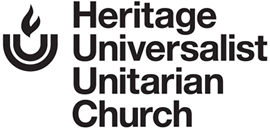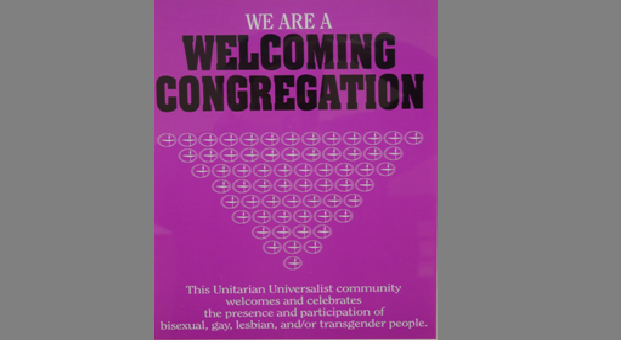by Mike Roberts, Church Historian
Over the next few months, it would be appropriate to highlight just a few of the many accomplishments of Heritage Church during our retiring minister’s tenure. It would be impossible to explore in depth all of those achievements that could be recollected, so we will restrict the number to just a few and let them stand as examples of Reverend Bill’s leadership.
In 1987, the Unitarian Universalist Association began to look at its congregations’ attitudes towards bisexual, gay, lesbian, and transgender people. The study revealed that many cases of prejudice and ignorance existed that excluded these persons from UUA churches. In 1989 at the UUA General Assembly, it was decided to begin a Welcoming Congregation program that would educate the membership to bring about positive changes in individuals and congregations regarding the bisexual, gay, lesbian, and transgender community.
In 2002, our HUUC church leadership took on the task of examining our own attitudes, and to offer a welcoming atmosphere to all who might seek the support of our congregation. The result would be recognition as a Welcoming Congregation. This effort was initiated by Amy Russell, the interim minister following the retirement of Eleanor Artman and before the hiring of Bill Gupton. When Reverend Bill was hired, our church was just entering the initial phases of the self-examination.
The charge to our membership stated that, “Our vision goes beyond the Welcoming Congregation Program. By taking this first step, we hope to explore more issues than those presented — like sexism, racism, atheism, to name just a few. Becoming a Welcoming Congregation will act as a catalyst to learning more about ourselves and to ending exclusion. Only when we are truly open to the wealth of diversity in our world will the inherent worth and dignity of every person be affirmed with a large voice.”
To accomplish these goals, the membership had to examine itself on three fronts. One was in education, a second in congregational life, and finally in community outreach.
The action plan called for four points to be considered in education:
1) Offer religious education that incorporates bisexual, gay, lesbian, and transgender life issues.
2) Promote participation by the congregation’s leadership in the Welcoming Congregation Program.
3) Offer a congregation-wide workshop program(s) including study and reflection.
4) Use of the UUA OWL program.
Six items needed were addressed under congregational life:
1) Form a broad-based welcoming committee.
2) Adjust congregational bylaws to include a non-discrimination clause.
3) Use inclusive language and content as a regular part of worship services.
4) Provide main worship space and ministerial services for bisexual, gay, lesbian, and transgender rites of passage.
5) Welcome bisexual, gay, lesbian, and transgender persons in the congregation’s brochure.
6) Ensure that publications, public information, and programming reflect the requested status of any individual as they may desire.
An additional five areas to study existed under community outreach.
1) Celebrate and affirm bisexual, gay, lesbian, and transgender issues and history during the church year.
2) Participate in and support efforts to create justice, freedom, and equality for the bisexual, gay, lesbian, and transgender communities.
3) Establish and maintain contact with local bisexual, gay, lesbian, and transgender groups to offer support and promote dialogue and interaction.
4) Advertise in the local press and other media that reaches the bisexual, gay, lesbian, and transgender communities.
5) Provide use of building space along with other UUA organizations when requested by members for programs and meetings of an Interweave Chapter.
The UUA strongly stated that most congregations were actively following many if not all of the guidelines listed above. However, they urged that each be addressed to improve and initiate programs to achieve the Welcoming Congregation status. To carry out the assessment and training process, a committee was established to tackle the work that needed to be done. That committee was chaired by Kathy Nalepa. Assisting her were Rae Jane Araujo, Russ Araujo, Cindy Fink, Donna Buckley, Peg Fay Feder, Sam Gamble, Martha Garner-Holman, Linda Conway Hensley, Dave Hollinden, Melissa Meyer, Pat Murray, and Layne Richard-Hammock.
Reverend Bill Gupton had joined the Heritage family shortly after the process of becoming a Welcoming Congregation had begun. Several committee members remember that he strongly supported the committee’s efforts but did not wish to interfere with an effort that was ongoing when he arrived. He would, of course, play a strong role in shaping Point 3 of congregational life, that being to “Use inclusive language and content as a regular part of worship services.”
To examine Heritage’s attitudes on the bisexual, gay, lesbian, and transgender community, a survey was conducted with the congregation, the results of which pointed the direction in which the church needed to work for improvement. Nearly 80% of those surveys were answered. The next step was to design workshops to meet the identified needs. These workshops were offered over the ensuing year. Also, the committee outlined twelve other activities which it had undertaken to meet the UUA goals but did not involve the congregation as a whole. Among those activities was amending the church’s constitution whose wording was contrary to the Welcoming Congregation goals. Of course, a positive vote by the congregation was necessary to approve the changes.
Over a year later, Committee Chair Nalepa presented the results to the congregation and asked that a vote be taken to adopt the resolution applying to the UUA for official recognition as a Welcoming Congregation. The vote was taken at the annual meeting on May 23, 2004 and passed unanimously. The last step was to submit to the UUA a record of the process and the changes that were made, as well as the congregation’s approval. The UUA approval was granted and Heritage officially became a Welcoming Congregation.
A guiding light of that effort were the words of Universalist poet Edwin Markham in his poem titled “Outwitted.”
He drew a circle to shut me out,
A heretic, rebel, a thing to flout.
But love and I had the wit to win.
We drew a circle to draw him in.
Image source: courtesy of Mike Roberts

